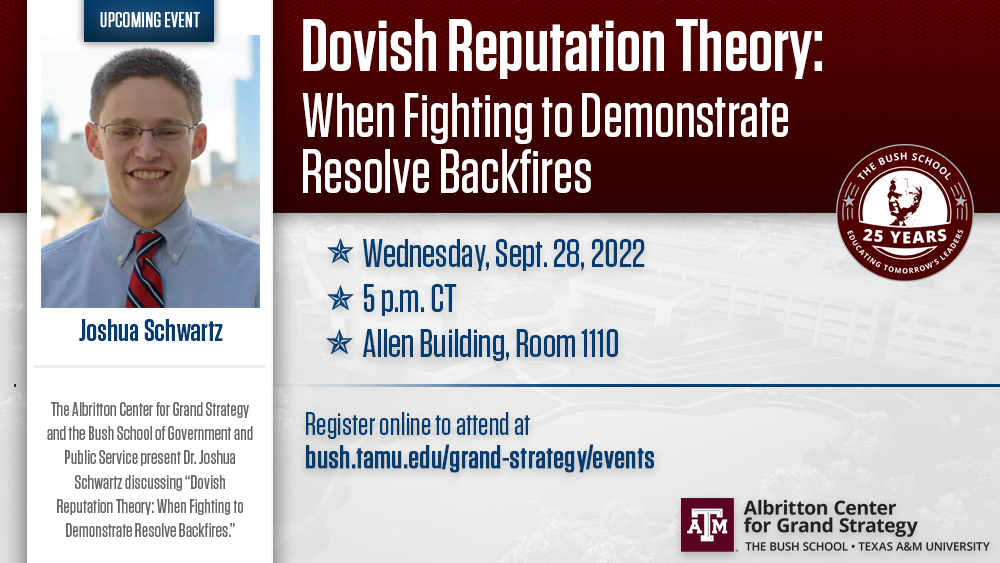
The Albritton Center for Grand Strategy (CGS) at the Bush School of Government & Public Service at Texas A&M University will host Dr. Joshua Schwartz on Wednesday, September 28,, 2022. Schwartz plans to discuss his paper, “Dovish Reputation Theory: When Fighting to Demonstrate Resolve Backfires.”
The event will be held at the Allen Building, Room 1110. Registration is required for the lecture, which begins at 5:00 p.m. CST. Register online to attend. If guests are unable to attend in person, a Zoom link will be included in their RSVP confirmation email.
About the Speaker
Joshua Schwartz is currently a Grand Strategy, Security, and Statecraft Postdoctoral Fellow at the Massachusetts Institute of Technology and a Hans J. Morgenthau Fellow at the University of Notre Dame. He received his PhD in political science in 2022 from the University of Pennsylvania and was a Predoctoral Fellow at the Harvard Kennedy School from 2021 to 2022. His research focuses on questions related to reputation, gender, drones, weapons of mass destruction, coercion, norms, and climate change, such as: should countries go to war in order to maintain or bolster their reputation for resolve? What impact will greater female leadership in the U.S. and around the world have on international politics? Why and how does military technology spread? What factors impact support for the use of nuclear weapons? Do armed drones reduce or increase terrorism? Schwartz’s academic research has been published or is forthcoming in International Organization, Journal of Conflict Resolution, International Studies Quarterly, and Conflict Management and Peace Science. You can also find his policy commentary in Foreign Affairs, Washington Post, Bulletin of the Atomic Scientists, Defense One, and Political Violence at a Glance. Before starting the PhD program at Penn, Schwartz graduated from the George Washington University summa cum laude with a double major in Economics and Political Science. During that time, he interned with the State Department and the United States Senate.
About the Paper
According to Hawkish Reputation Theory, states inevitably harm their reputation for resolve by backing down and enhance or maintain it by choosing to stand firm and engage in military conflict. This logic has been used, at least in part, to justify consequential interventions like the Vietnam War. However, is it always true that states maximize their reputation for resolve by refusing to back down? Schwartz advances a new theory of reputation—Dovish Reputation Theory—that argues the answer is no. In contrast to both Hawkish Reputation Theory and a set of critics who argue that reputation is unimportant in international politics, Schwartz argues that reputation matters, but that in crucial circumstances fighting can worsen one’s reputation for resolve. In particular, fighting costly wars often produces war-weariness among a country’s public and leaders, undermining a state’s actual resolve. Foreign powers—observing these signs of war-weariness—then downgrade their assessments of the state’s resolve precisely because of its decision to fight. Schwartz provides evidence for this novel theory through an elite experiment conducted on members of the United Kingdom Parliament. Overall, this project indicates that the benefits of using military force are lower than the conventional wisdom suggests.
The Albritton Center for Grand Strategy serves as an intellectual hub for the critical examination of American grand strategy. Specifically, the Center supports research that takes a fresh look at America’s grand strategic choices; fosters dialogue between scholars and practitioners; and helps prepare a new generation of public servants who will be grand strategic thinkers.

